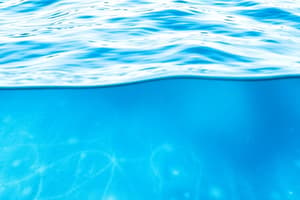Podcast
Questions and Answers
What is the primary reason that ocean water is unsuitable for drinking and agriculture?
What is the primary reason that ocean water is unsuitable for drinking and agriculture?
- The high concentration of dissolved salts, known as salinity. (correct)
- The presence of minerals like magnesium and calcium.
- The presence of dissolved gases like nitrogen and oxygen.
- Its low temperature, making it harmful to consume.
From where does the majority of salt in ocean water originate?
From where does the majority of salt in ocean water originate?
- Chemical reactions between seawater and volcanic gases.
- Dissolution of minerals from rocks on land by rain and rivers. (correct)
- Atmospheric deposition of salt particles.
- Direct extraction from deep sea hydrothermal vents.
Besides sodium chloride, which of the following are also significant chemical components found in ocean water?
Besides sodium chloride, which of the following are also significant chemical components found in ocean water?
- Lead, mercury, and arsenic.
- Aluminum, silicon, and phosphorus.
- Magnesium, sulfate, and calcium. (correct)
- Iron, zinc, and copper.
Which of the following gases are naturally dissolved in ocean water?
Which of the following gases are naturally dissolved in ocean water?
How can nitrogen-based fertilizers from agricultural runoff negatively impact ocean ecosystems?
How can nitrogen-based fertilizers from agricultural runoff negatively impact ocean ecosystems?
Oceans are considered carbon sinks primarily because they perform which critical function?
Oceans are considered carbon sinks primarily because they perform which critical function?
Why does ocean water require more energy to change temperature compared to air?
Why does ocean water require more energy to change temperature compared to air?
What is the primary reason ocean water freezes at a lower temperature than freshwater?
What is the primary reason ocean water freezes at a lower temperature than freshwater?
How does temperature primarily influence the density of ocean water?
How does temperature primarily influence the density of ocean water?
Which combination of characteristics would result in the densest ocean water?
Which combination of characteristics would result in the densest ocean water?
Flashcards
Salinity
Salinity
The amount of salt dissolved in water. It's the reason why ocean water tastes salty.
Concentration of Salt
Concentration of Salt
A process where water from the surface of the ocean evaporates, leaving the salt behind, making the ocean water more salty.
Dissolved Gases in Ocean Water
Dissolved Gases in Ocean Water
Ocean water contains significant amounts of dissolved gases like nitrogen (N2), oxygen (O2), and carbon dioxide (CO2). These gases are crucial for marine life.
Nitrogen Runoff Impact
Nitrogen Runoff Impact
Signup and view all the flashcards
Layered Ocean Water
Layered Ocean Water
Signup and view all the flashcards
Heat Capacity
Heat Capacity
Signup and view all the flashcards
Ocean Carbon Sink
Ocean Carbon Sink
Signup and view all the flashcards
Density
Density
Signup and view all the flashcards
Freezing Point
Freezing Point
Signup and view all the flashcards
Study Notes
Ocean Water Properties
- Ocean water covers about 97% of the Earth's water.
- It is not potable due to high salinity (salt content).
- Salt in oceans originates from land (eroded rocks, minerals, and volcanic activity).
- Evaporation concentrates salt in the water.
- Ocean water contains various salts (sodium chloride, magnesium, sulfate, calcium, potassium) and dissolved gases (nitrogen, oxygen, carbon dioxide).
Salinity and Chemical Composition
- Salinity is the amount of salt dissolved in water.
- Ocean water's salinity is higher than freshwater.
- Excess nitrogen from fertilizers can cause rapid plant growth in the ocean, depleting oxygen and harming marine life.
- Oceans absorb carbon dioxide from the atmosphere (carbon sinks), influencing global climate.
Ocean Water Temperature
- Ocean temperature varies geographically, highest at the equator, decreasing toward the poles.
- Ocean water has a high heat capacity (requires more energy to change its temperature).
- It takes a long time for ocean water to heat up and cool down.
- Freezing point of ocean water is lower than freshwater (around 28°F).
Ocean Water Density
- Ocean water density depends on salinity and temperature.
- Higher salinity and lower temperature result in higher density.
- Dense water sinks, less dense water floats.
- This layering is important for ocean currents and life.
Studying That Suits You
Use AI to generate personalized quizzes and flashcards to suit your learning preferences.




